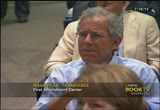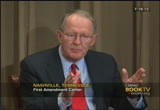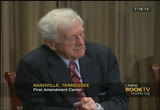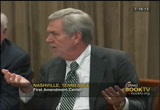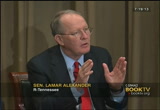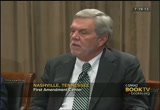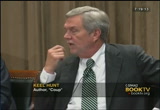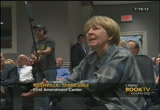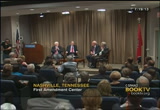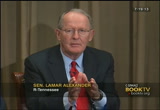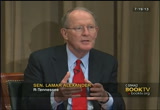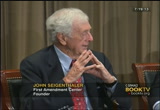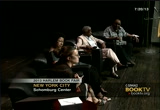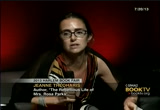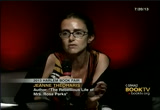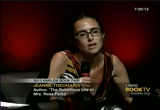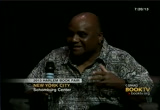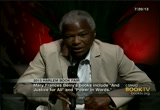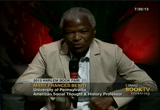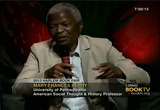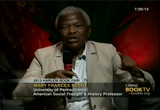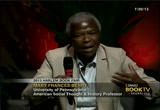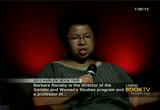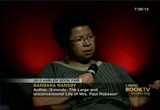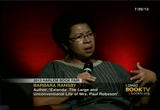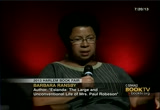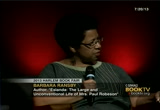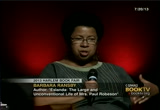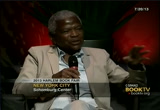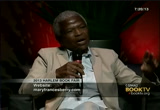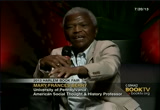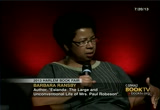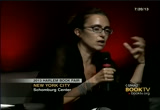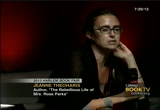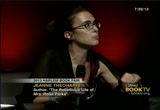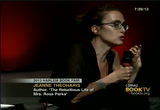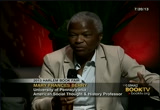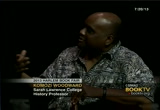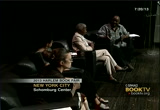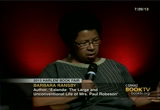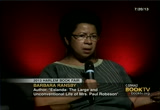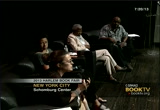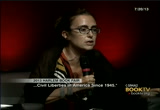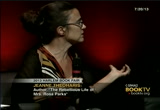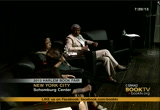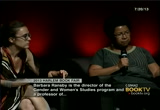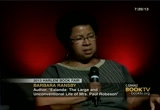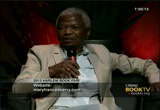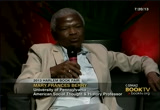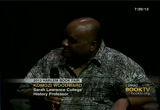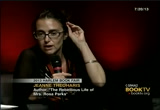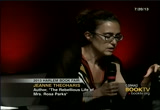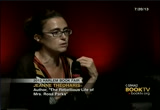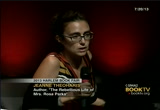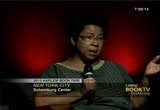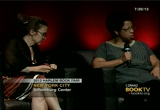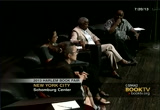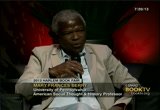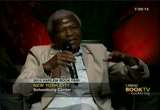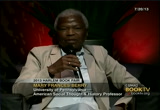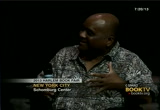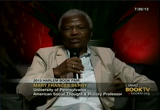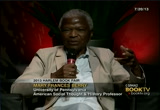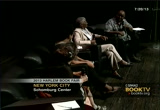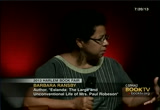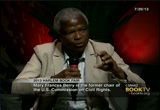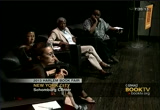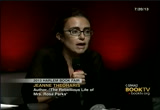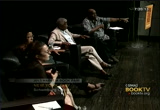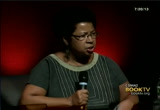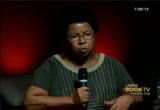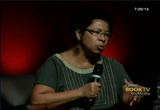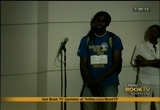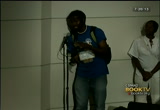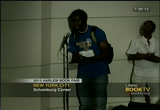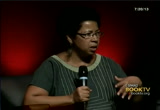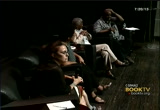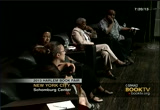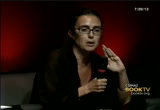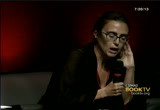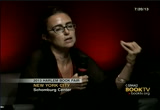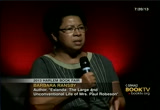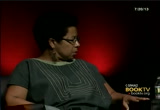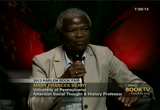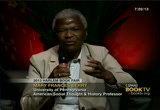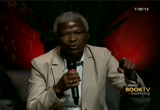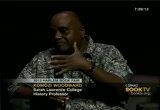tv Book TV CSPAN August 11, 2013 8:15am-9:46am EDT
8:15 am
>> i don't -- i think the shock, there were some people who came to the capitol the next morning who had not seen this on tv. there's one -- is lee curtis here in. >> lee is here. >> she is one who showed up for work the next morning and be didn't know this had happened. and yet their work was turned upside down. >> she was receptionist in the governor's office. >> a very new and short-term receptionist in the governor's office and has worked for state government now for 30-plus years. she's very young. >> but on that question, keel, one, based on bill coke's advice -- i believe it was bill's -- i asked the new cabinet members to take their offices but to make no decisions between the swearing in on wednesday and saturday on the new swearing in. so those decisions could not be challenged later by anybody. so we tried to my poise that.
8:16 am
but i -- minimize that. but i think the question you asked, i mean, most miraculous about the whole thing is not that something didn't go wrong, that's pretty miraculous, but that nobody challenged it. >> yes. >> i mean, the only challenge came because i took the position that if the pardons hadn't been delivered, they couldn't -- i said lock the prison door, don't let anybody out. roger humphreys got out because that was earlier in the week, but the rest of them didn't. they sued, and they got out because the courts eventually held that once the governor issues the pardon or commutation, that's it. >> and for those of you who don't know who roger humphreys was, please read the book. it is, that is -- keel, you captured the drama of that story. i mean, it's a stunning story. lee smith was part of it. frank sutherland had his hand on
8:17 am
it. >> keel, with a story that has this much detail as you have in your book, you had to encounter factual conflicts. what was the biggest factual conflict in your interviewing that you had to resolve? >> whether it was timing or necktie or louis donaldson. [laughter] and i say that, i mean, that's true. and the answer was it was tom's necktie. but we respect mr. donaldson. [laughter] but i say that because, in fact, i was struck by how much common ground there was in the shared memories of these people 30 years later. i mean, it was astounding that how the thing happened in the afternoon in the hotel room, call the title of that chapter is "the dance," you know? how did that go? i mean, that's a very
8:18 am
complicated -- bill koch was very patient with me to help me understand how all that worked. but there was an extraordinary level of agreement many years later, and i thought that was profound. >> you know, one of the -- sure, question. >> i was curious if anyone heard from roy blanton in the days following this? did either of the speakers or bill leech, did anybody hear from blanton? >> i can give you -- i did not with an exception. vanderbilt did an archive last year, and the librarian is here, of my papers as governor. and i thought it was just a bunch of yung that nobody would bother. -- junk that nobody would bother. they found all kind of things in there. one thing they found was an envelope hand addressed to me with ray blanton's return address on it, and in it was the key to the governor's office. he had mailed that to me. >> and later on that night i
8:19 am
went back to my office, and we had code da phones in those days with the blinking red lights, and i pushed the button, and it was governor's highway patrolman, i guess -- i can't remember his name. he said, mr. hardin, this is so and so. the governor wants you to call him. and it was a very point i can't moment -- poignant moment. talk about resistance, i think one person that did resist was the governor's counsel who was walking out of his office with the commutations -- >> louis stopped him, right? >> and louis -- >> tell that story. >> well, eddie sisk had been arrested the muddle of the month before -- the middle of the month before, and so robert hill ard of nashville was the governor's legal counsel. so when tommy and bill koch and louis donaldson went up to secure the capitol, they made
8:20 am
their way down to judge lille ard's office on the ground floor, and he was preparing some final paperwork and was putting it in his briefcase, and louis donaldson says, bob, you can't leave. and he say, well, i'm taking these to the governor, and he says, no, you're not. it's a very tense moment, a very critical moment in this story. and he says, well, i just -- well, what are we -- he says i'll need to get the governor on the phone. he says, well get him on the phone. calls, he's not immediately available. but bob lillard says you can take the papers, i'm going home. my work here is done. the phone ring, it's governor blanton. and the judge answers and says, yes, sir, he's sitting right here. and he says it's governor blanton, and louis says i'll talk to him. he says they say you can't bring me your papers, and he say,
8:21 am
well, i'll come to the capitol, and mr. donaldson says, no, you will not. i hope you feel the heaviness of this exchange. these are two extraordinary individuals, very distinguished people -- >> well, and the rest of that conversation is by blanton says so louis by whose authority, and louis says by the governor's authority, and blanton says i am the governor, and louis says, not anymore. [laughter] >> bill leech told you you were not the governor. he says, well, i'll come down there, and louis says, i won't let you in. >> question. yes? the dean at -- [inaudible] >> keel, when did you start the book? what inspired you to start the book? why is it coming out now, maybe not 10 or 15 years ago? >> well, a good question. it took me about a year and a half to write it, finished it about a year or so ago.
8:22 am
sue with the vanderbilt university press is in the back of the room, sue, thank you. she and her colleagues took some time to do their good work, and i'd like to also recognize richard mccarty who linked me up with the vanderbilt university press and vice chancellor beth fortune is also here. it took a while for the press to do their work. probably the better answer, the research, all these interviews. but it was fun to do because it took me back to my reporter days, and in some ways this book is as much about journalists as it is about politicians. but that took a while. so we probably started the interviews five, six years ago, and people were very patient with me. >> i'm going to ask the last question, and i'll ask the senator. i know these were six tough hours, unforgettable hours.
8:23 am
as honey said, the worst day of her life. what about the days following? how did what happened that day impact your administration over the next four years? >> well, it'd be tough for the country, but if every united states senator serving today had a six-hour boot camp like i had for how to get ea wrong with the opposite -- get along with the other party, the country would be better off. [laughter] [applause] you know, this didn't really occur to me until we started talking about this, but with i didn't really know ned and john wilder and bill leech. i mean, i knew them, you know, we'd met, but we had never worked together. and i, and i was a young republican governor in this
8:24 am
democrat establishment that had grown up over a half century. i mean, everything was democrat; the newspaper, the lobbyists -- [laughter] the supreme court, i mean, everything was. and so how was this going to work, you know, for the next four years -- hopefully eight, from my point of view. but in that four or five hours, we found a way to work together on something that was more difficult than anything else he'd ever deal with in the next four or eight years and developed a level of trust and respect for one another, and that carried on the whole time. and so when we got into how are we going to, you know, pay for the road program, are we going to borrow money or raise taxes, when we got into how are we going to deal with the national education association on rewarding outstanding teaching, when we got into all those things, we had a way to do it. and we got a result. so i was lucky. we survived that four or five
8:25 am
hours, and it gave me, it gave me a boot camp of how to get along with some really very, very good people. who i was privileged to work with during those eight years. i've always -- while hal wasn't one in the state government that i worked with, i've always -- i never really told him -- admired his courage in making the call that day. >> you know, this afternoon hal and i and some others who are here were in the supreme court room listening to john hooker and the deputy attorney general kleinfelder argue a case, and i will tell you for my part, the ghosts of 34 years were still there. [laughter] it was a stanley cupping moment in the history -- a stunning moment in the history of the
8:26 am
state. i thank you, lamar, and you, hal, for your leadership navigating us across that stormy sea during those six hours. keel, thank you for recording it all in a wonderful book. i'll ask all of you to join me in thanking these three panelists for -- prison. [applause] >> you're watching booktv, nonfiction authors and books every weekend on c-span2. >> now on booktv from the 2013 harlem book fair, a discussion
quote
8:27 am
about the legacies of rosa
8:28 am
we want to start the conversation by talking
8:29 am
as the two men who had lynched emmett till have been found not guilty. so this is november 27, 1955. rosa parks sits there and she is talking about the lynching of emmett till and he is talking about the deaths of two other organizers in mississippi who would try to register to vote and have been killed and she is angry and she is sad and she is despairing because she came to that night having spent more than a decade organizing around cases like this and what was particularly sort of exciting about this case was there have been enough organizing and enough awareness that there had been a trial and yet still the two killers go free. and i wanted to start there because i think many people
8:30 am
would have made the comparison between the lynching of emmett till and trayvon martin, but i think we can go deeper in that comparison and to think about that comparison not just as a comparison of sadness and of anger but of what follows. because i know all of you know what's going to happen four days later on december 1, 1955 and that is rosa parks who has spent two decades organizing. she begins her adult political life around around the scottsboro case in spent the past decade turning it into a more activist branch and so she comes to december 1, 1955 with a tremendous amount of organizing experience in a tremendous amount of activism and she comes with that evening fresh in her mind.
8:31 am
and so she is going home from work december 1, 1955 and at the third stop the bus driver realizes that the bus has filled and one white man is left standing and four people are going to have to get up. as she tells it, she thought about her grandfather who is a supporter of marcus garvey. she thought about -- but the bus driver said you all better -- and she thinks to herself this is not making it light on us as a people. she thinks about emmett till and she decides she had been pushed as far as she could be pushed, that to get up would have been consenting and she did not consent. and she said no. and so i guess i wanted us to start there today because i think the comparison and i think
8:32 am
it's a very important comparison to be thinking about trayvon martin and the light of that history but i think that history offers us something very profound and that is also the history of how people are moved to action, because she in that moment of all of the things that many of us are feeling denial, the anger, the sadness, then comes action and hopefully we can talk more about the kind of rest of her political life but i wanted us to start in that moment with her and then in that moment four days later where she makes, where she takes that and she turns it into agency and she turns it into action. thank you. >> now tell me -- thanks jeanne. [applause] i only got a chance to meet rosa parks one time and it was quite an experience but mary did you get a chance to work with rosa parks? >> well, i am sitting here
8:33 am
thinking that my rosa parks is probably different from most peoples. people's. i really like your book because your book tells the public a lot of things about her that most people don't know and they just see her sitting down on the bus. and i was up at the congress on mandela's birthday. my dear sister maxine waters from california organized a great celebration. they even had african dances, beating the drums. you can even see it on c-span. it was terrific. i never heard that much much noise and the laws of congress and speaker banner on the look on his face when he began to speak, he hadn't heard that much either. [laughter] but i was thinking and we all spoke about the movement and so on and brother nelson had a
8:34 am
birthday but i was thinking about rosa parks. knowing i had to come up here because i knew rosa parks. she came to the three south african movement demonstrations that we organize for a couple of years to get sanctions and all of that but i knew her before that. the first time i encountered her in 67 i have been in vietnam as a reporter when the riots happened and i came back right after the riots and there was a people's inquiry set up in detroit and rosa parks was a member of the commission. it was the people's commission. the sit down on the bus woman, she was on this commission and a radical lawyer who we all loved, a young black lawyer who was a radical, was the guy who organized it and after that to
8:35 am
me was a parks was not just an icon. she was a person who i saw that had all kinds of activist things that we were all up to all the time. she was spared and she spoke at the south african movement demo. we told her to speak and she spoke eloquently at that and before that was at the convention where she and i were both and gary when all the civil rights people were denouncing us. the convention and gary, she was there. rosa parks was there when jimmy carter had an anniversary of round and i was speaking because i was running education and i made a freudian slip and said something about the president i didn't mean to say and she just died laughing. and please do all the time, correctly used to say to me the
8:36 am
reason why you have to go you have to go all the these things and you won't get involved is so we can see each other. i was used to seeing her and talking to her all the time but to me she was on joanne littles committee. think about rosa parks in that kind of context. rosa parks believed like malcolm that you should use anything that comes to hand in the circle of freedom. yes. [applause] and so to define her as those meek woman who sat down on the bus and all i want to say about that is being up there and the congress and going through statuary hall where she is now and looking at sojourner and the emancipation hall and so on and i thought to myself, if people knew what we know about rosa parks she wouldn't be in there. if they knew what i am saying about rosa parks, she wouldn't be on this stamp.
8:37 am
rosa parks, with these historians have done is what we call a work of recovery, recovering the real deal about people. what barbara has done, eslanda robeson was overshadowed but her whole life was a wonderful activist and intellectual person they have recovered them like some years ago i recovered to callie house and the reparations juggle. rosa parks was at the first meeting of the revelations. you guys have to know what in culprit is. reparations, you all heard that. so when i think about rosa parks i think of her and those sad conversations and all those places and i think of her as a full-bodied kind of reformer and radical that she really was and how wonderful it is to have her up there sort of like when i
8:38 am
passer at statuary hall i kind of smile and say, if they only knew. [applause] >> speaking of recovery but are recovering in terms of eslanda robeson? >> well you know i think these two women, first of all its great to be on this panel was such fun historians and mary has bought the good fight for a long time with such integrity. but when i think of a comparison between the two on the surface there might not seem to be a lot in common but in some ways that both were the shadows of larger-than-life male political figures. rosa parks in some ways in the shadows of dr. king as far as how a story and has treated her and eslanda robeson because of her husband paul robeson and rosa parks as one dimension away
8:39 am
and eslanda robeson almost invisible. i can't tell you how many people said paul robeson's wife. i knew he had a wife but i didn't know much about her. eslanda robeson indeed was a remarkable person and a biographer's treasure because she had such a rich life and she spent a lot of time documenting that life so that made my job a little bit easier but she began her career as a chemist working at at columbia presbyterian hospital then quickly shifted to serve as the architect of paul's early career. she was his manager, publicist etc. but that's not really her main contribution our accomplishment. i was most drawn to her and interested and excited to do this work because of her largeness of her life and i mean that on a global stage. i think the importance of telling her story in particular and rosa parks is the international significance of their political contributions and eslanda robeson in
8:40 am
particular was an anticolonial activist, a writer and human correspondent, an anthropologist. she was someone who was there the founding of the united nations in 1945. she traveled to the front lines of the spanish civil war in 1938. she traveled to africa in 1936 to sub-saharan africa after a light -- italy occupied ethiopia. she took a ship to south africa and then uganda when the time that it was not only difficult but dangerous for a black woman to be traveling in colonial africa. spent a number of months there and met with someone about that antiapartheid activist oracle conference in the free state in south africa. that began her internationalism, her emergence as a world citizen if you will and it reminds us
8:41 am
all i think of a very rich tradition of black internationalism. the other thing, she also goes to the congo in 1946 after she writes a book and becomes quite a public activist and in congo she is followed by british intelligence. and my five follows her around belgium and the french congo worrying she is going to go into british colonies and write these rather -- and years later they were probably scared that she done at the time -- but to write this chronicle of her travels talking about the incendiary ideas she is promoting like africans being moved by their own kin in the words of one of agents. so she lived a very large life and really forged her own political identity and her identity as a black woman in a global context and in the context of embracing an african struggle and in the context of anticolonial struggle.
8:42 am
she had a class with -- and chinook kwame and coma and a good friend of the first prime minister of india and his sister so there was afro-indian, afro- asian solidarity which was pretty remarkable. in fact it was the sister of nehru the first woman president of the general assembly a good friend of eslanda robeson. their mother was in prison for independence activities in india. their daughter spent time at the robeson home and considered eslanda robeson their second mother so this rug-based third world solidarity that we saw in that period after world war ii, eslanda robeson was in the thick of it writing and speaking and of course this comes at a price. she and paul robeson are
8:43 am
persecuted during the mccarthy era. she is called for joe mccarthy's anti-communist committee and interesting way people thought because of her connection to paul which i think was part of it but joe mccarthy leans over and grills her about her political affiliations and she asks her about her 1945.african journey which was seen as subversive because it was an anticolonial document. the inquisitor, leans over and says are you sure you wrote this book? she was somebody who was not short on attitude so she said do you think i could not read a book like this all by myself? how dare you ask me that question. the other thing she ultimately goes to the committee issue sort of flips the script and she says i don't even recognize these people. this committee has on it
8:44 am
southern senators who don't allow black people to vote in their states. so you know she had that kind of defiance and that kind of toughness about her as she went into sometimes very dangerous political terrain. people have just gone to jail and then exiled and so forth and she was also outspoken on her anticolonial activity. >> i wanted to ask all of you, why is it, how does it come to pass that all of these great women have taken such giant steps and are visible in textbooks when our kids go to school? >> that's a tough one. >> i don't know. i don't think -- rosa parks of course is not invisible. just for sitting down on the bus part is everywhere but all the other stuff i told you because they don't want the children to understand that you know you can make good triumph of evil by
8:45 am
doing a whole bunch of different things and this woman had many dimensions and they don't want them to get ideas in their heads. the other part of it is that when people write books and when they do stuff they keep writing the same thing over and over again. for example when they write about the history of black people in the period after reconstruction up until the 1920s or 30s until the great migration to the north, they write about booker t.. wb and booker t. and then more recently there are people writing about the club women, the color club women bound and social organizations. even after i recovered the reparations that bend and even after i documented that this woman started a movement with 300,000 women asking for reparations in 1890 for all
8:46 am
those legs and she was an ex-slave herself, even after that was documented and everybody gave praise and gave their prizes and all that, when they went about the reconstruction of the great migration they write about w.e.b. and booker t.. and then they migrated to the north. and so it's really hard. part of it is that she was a washerwoman and these ex-slaves were poor people. i think eslanda robeson has a better chance of being included in the narrative then making a full picture of rosa parks. you did a wonderful book, both of you good but since robeson was, you know she was -- rosa parks was a working-class woman, down-home woman. didn't go to college and all that stuff but robeson wrote
8:47 am
things. the other thing is if you write something historians take you more seriously and will put you in books than if you just have records like the records of the people that were in the movement and so one and all the rest of them. so i think that's it. >> unless, unless you write really radical things. i was just thinking, clearly in one of the contradictions and interesting things about eslanda robeson was her class privilege which she ultimately risk and they lost a lot of what they had of course because of the left-wing views but in some ways paul robeson was blacklisted during the mccarthy era and he actually in some ways have been black worsted in history because even though that a certain amount of privilege and were educated at a time when certainly most black people were not, what even known about most of the places that they have
8:48 am
traveled to so there was that privilege but when they allied with a radical movement of the world and embrace socialism over capitalism and all that they become very dangerous and so you will see book after book where eslanda robeson would have been a logical person to include and she is just painfully absent. that is why rosa parks is reduced to one dimensionality and eslanda is kind of kept in the wings. i agree with you, people who don't leave a paper trail which eslanda definitely did that the people who don't leave a paper trail or don't have the skills and the lecture to do that. >> i think part of the other, one of the other issues in one of the other ways i think we see the civil rights movement represented over and over and we are seeing it again as we come to the run-up of the 50th anniversary of the what march on washington is the movement is
8:49 am
only southern movement. we talk about rosa parks full political history. that has to include her political life in the north. in 19578 months after the boycott and she loses her job during the boycott. her husband loses his job during the boycott and they're getting constant death threats. they had to leave montgomery even after the boycott ends because they are still getting death threats. they leave for detroit which is where her brother, her brother sylvestesylveste r. if you see this represented even in schoolbooks, this tends to be a little epilogue like a happy ending. rosa parks goes to the north, the vacation house. [laughter] when the rosa parks parks calls detroit the promised land and she will then spend more than half of her life, more than half
8:50 am
of her political life fighting the jim crow north. and keeping rosa parks in the south like mary and barbara have said the one dimensional picture of the placenta to southern bus. part of what she will do with the second half issue will be talking about transportation in north. she will be talking about housing in the north. she will be talking about police brutality, about criminal justice. these are issues he was working on in montgomery in the 40s and 50's but then she takes those and they don't stop. and as she puts the shoe doesn't find too much difference between what she leaves in montgomery and what she finds in detroit. yet i think our public history is much more comfortable with the civil rights movement in the south because that has a happy
8:51 am
ending and it has an ending. we have the civil rights act and the voting rights act and those are crucially important, but then the struggle continues and the struggle continues not just in montgomery and atlanta but continues in detroit and continues in new york and continues in pittsburgh and so if you look at what rosa parks is doing she is in all those places. and she keeps struggling against the death penalty, against the war in vietnam, against apartheid in south africa. she is working for conyers. she is looking at things like welfare and social services and housing and urban renewal. although the issues that face us today so i think part of why this doesn't get included is as mary said i think it gives us more tools to struggle with, to imagine if we have these histories that are northern, better international, that go
8:52 am
into the 70s and 80s and 90s. and i think that is again what this history of recovery or reclamation, i think part of what it does i would argue that helps us see today differently. >> look, people -- those be the other thing is if you think about it no one ever let rosa parks. she would not talk. she would be at all of these things and she would be the symbol. rosa parks sat down on the bus. the only place where she got to make an actual talk about what she felt was when she came for the protest and got arrested that they were having on apartheid and they said you've got to speak. we don't want you just to calm and march. you've got things to say. talk to the people. but nobody was really interested in all those things just like the national council --
8:53 am
i told them one time you go to all these things with this for years. the men don't let you say anything from the beginning and usually people don't want you to say anything in the old days when he first started. they just wanted her to be there. rosa parks, they wanted her to be there so they could say ms. rosa parks stepped out of the bus and no one ever asked her what she thought about whatever it was. that tells you something because some people knew what she was saying. if they didn't, they were taught >> look, a lot of people in response to this horrible verdict are thinking about how do we organize ourselves and it seems to me that part of cutting these stories out of a woman like callie house who organizes the movement before -- organizes his movement or a rosa parks and the washer women and
8:54 am
the working people in montgomery who marched and boycotted the process all those times. although these are stories about how people build a movement and it seems that one way to demobilize us after these certain elections is to take away the tools of how did they get to these triumphs in the first place? you have to be organized and that is why i was so glad you wrote about callie house. it's embarrassing after decades of studying these things to realize you were always kind of a beginner because these very important stories that we need to know about. now one civil rights leader -- i was at the memorial and this was years ago. the young people in the movement came up and said he was illiterate. he was always late to meetings and things like that and on and on. i realize the young people who have come in living on the
8:55 am
triumphs of this poor man who founded one one of these black r organizations didn't understand who he was elated to get up there and it occurred to me that jesus did not write any books. everybody knows he made history. so just like jesus all these people i'm making history, and they rejected my first book. who are these people? they said they are the people who made history. so i think that's part of why i think we get one image and not another because it's demobilize is us. >> use raise the issue of book publishing at a literary event and merry talk a little bit before about why is it that history has been distorted and repetitious in terms of repeating certain myths and not including others which you know reminds me particularly of the way in which eslanda robeson approach to work. she wasn't intellectual but she
8:56 am
resisted a elitism and formality. she was trained as an anthropologist and never got her ph.d.. she was never recognized formally as a scholar even though she was a researcher and so forth and in a way that liberated her to say what she wanted to say outside of a canon or outside of restricted boundaries that academic institutions and sometimes publishers put on people and that is part of the myth making. there are knowledge industries that regulate the distribution of certain narratives and certain information and the center of that. they don't call it censorship. that is not an interesting story or that doesn't speak to me. ..
8:57 am
>> so journalism and the articles and the pamphlets this -- people don't read 500 page book. they read articles. we need to have newspapers and blogs, that's really what makes these movements work. >> i want to go back to the thinking about what they offer us today and then kind of what the myths -- i often talk about them is a fables because i think they're told to us to give us certain messages i would argue are sort of problematic. i think most school children now learn that rosa parks was
8:58 am
courageous. right? but that courage is framed through this image of a tired, accidental act that spontaneously bursts a movement. right? when, if we actually look at her courage, what her courage is about is something far more profound. and first, it's the courage of perseverance. right? she has been active for two decades at that point, politically active for two decades. she had made stand before, people she knows made stands before and they basically have gone nowhere. i think part of the lesson of somebody like rosa park, many of these activists, is how much courage is about perseverance, and that even when she talks about her bus stand, one of my favorite quotes is she talks about her arrest being annoying, and irritating.
8:59 am
and i think in that she has decided this is a line that's too far. but she has no sense this is the beginning of a new chapter. right? and so i think part of what we, i think, learn from these histories is that you have to do things again and again and again, and you don't see the moment that history moves until it's -- we're well into it. and so i think part of what the -- what we might call tissue call it a children's book, sort of story of rosa parks. if we have that story, it's -- you make stand, everybody rises up. except that's really not how it works usually. right? and so i think part of what these histories allow us to see is the actual work of organizing the actual work of having to do it again and again and again,
9:00 am
there's not going to be a sign that this act is going to be the important act. ..anted to start with that november 27th mass meeting on the acquittal of emmett tills' murderers, is if we imagine rosa parks that night, imagine king that night, right? they have no sense that in a week, history is going to be moving in a very different way. and part of it is that sort of taking what you have and taking the fact you have done things before and not letting that be the stopping place but a starting place. >> the other thing i think is a value of your treatment of rosa parks and your work, and also your life, is the connectivity.
9:01 am
there's a way in which figures get narrowed at times. but there's also a way in which issues get some returning -- shrunk and how we measure success and defeat. rosa parks wasn't just concerned bat seat on a bus. so, similarly, rosen did not confine her notions of black freedom and black politics, which was her starting point but not her end point to the u.s. borders. she was concerned what was happening throughout the african content and what was happening in asia. she traveled and met with the maury people in new zealand. a sense of connectivity of struggles. i wag recently in belfast, northern ireland, and anyone who visited there, there are these amazing murals and a road on which there are solidarity
9:02 am
murals which celebrate the grabbing freedom struggle in ireland, and i think back to when we appreciated a radical radical jim the connections that have to be made between the communities because we'll always get the crumb victories we're see and ones that are not happen? able. so in the larger rosa parks story in the work that mary francis berry has done for so many years, talking about haiti. talking about south africa, et cetera, that big picture, that globe sense of freedom we have to embrace. if the histories are going to be meaningful, and our own present and future, in the light of the zimmerman decision, and in the light of the fact that the world is on fire in many respects, from syria, to cairo, to all over. so, those are struggles we have
9:03 am
to about connected to and they're an extension of the black freedom movement. >> i think what is a takeaway from all this is that we quote a lot, and i do it in speeches all the time, frederick douglass. we all say, can't get freedom without struggle. we all say that all the time. people can recite that. when it comes to struggle, sometimes we act like we don't believe that's what you have to do. that it ought to become easier and easier as time goes by. somebody said to me, you know, i wouldn't have thought that since we got obama, that the supreme court would be deciding things against us and that zimmerman would be free. we got obama and we were all celebrating. well, a year ago, wrote a book
9:04 am
with a chapter in it called "blacks and the politics of redemption." and we say that black people would not learn until we all got the right to vote and could vote freely and elect people and so on. that you can't get everything from voting. voting is important and you have to do it. but that protest is an essential ingredient of politics, and so while we're going around quoting frederick douglass, that's think about miss parks, miss robeson and all these people, and real rise that people tell you, you don't need to have a moment or be protesting. all you need to do is vote. first of all they're trying to suppress the vote in case you hadn't noticed. but the lesson is that you really, really have to be -- you need a movement and you need to be persistent, and you need to not give up, and you need to be strategic, and you need to think
9:05 am
about what you're doing. so that you can make -- and that you can make change by doing that. and you don't have to be violent. you can be totally nonviolent. many ways to make change. so i think these are the lessons i learned. >> i was at the memorial for vicki garvin in died in '95, i believe. they did a video, and she was in a nursing home. and she said, i'm telling all these people out there, you have no excuse for not being active because i'm here in this nursing home rite can letters, trying to educate myself. so it seems to me that many of the women we're talking about were long distance runners. right? i don't think rosa parks ever missed a step. right? >> i think it's really -- one of the amazing things about writing a biography of rosa parks it's literally a biography of struggle in the 20th century and goes right up -- she was
9:06 am
northern 1913, her grandfather is a garveyite, the month comery bus boycott, it's the war on poverty and antivietnam, it's sort of a fair criminal justice system to apartheid so the death penalty, to u.s. policy in central america, to the million man march. >> you said that in the clippings you were reading, she is cut thing newspapers out and reading about the world. >> right. so, part of rosa parks' papers are at wayne state, and part of that are rosa parks' clippings from the 1960s and 1970s. so you get to see the issues she is following. before we had sort of lexus nexus and all this stuff, what you would do if you were committed intellectual political activist, when you read
9:07 am
something you would clip it out so you could show it to your friends. so rosa parks wasn't avid, avid reader. read multiple newspapers a day, black newspapers, black periodicals, and she saved many of them. and they're at wayne and you can see them, and you can see these different issues she sort of clipped and is reading in the '60 asks and 70s. she gives that part of her papers in the late 'sevenness, and it's amazing what she is thinking about. and so the kind of whole very variety of issues from economics to labor to international issues, to criminal justice, and seeing those issues as being connected. but it wasn't just one, but many. and so it's an amazing -- >> jeanne, most people hear that be civil rights movement, you imagine everybody knows who rosa
9:08 am
parks is, so if she went into the employment office right after this victory, she would be the first person to get a job. right? what is the truth on that? >> one of the sort of hardest parts of writing the book on rosa parks is the chapter in the middle which i call the decade of suffering. and that is, i think, part of the kind of accidental sort of bus lady, right? one of my students always talk about the myth of the bus lady. and part of the problem with that myth is that it also misses the amount of sacrifice that these kinds of stands take, and that in rosa parks' -- her specific situation, what a tremendous sacrifice her bus stand was for her family's economic and physical health for a decade at least. so, literally, they cannot --
9:09 am
they never find work again, steady work again in montgomery, and then they move to detroit in 1957 and they still have trouble finding steady work. i mean in many ways, one of the heroes of my book is john conyer. rosa parks volunteers on john conyer's first campaign in 1964. persuades king to come to detroit on conyers' behave. king comes. conyers actually wins the primary by 40 votes. imagine american history, john conyers hadn't won. so, one of the first things he does,s he hires rosa parks in 1965. this is her first -- chev is working basically in what is a glorified sweat shop at stockton sewing company, doing piecework, and so part of i think -- again,
9:10 am
i'm echoing what has been said, the amount of -- again, we all know the frederick douglass quote but the kind of sacrifice it took. right? and the sacrifice it's not -- that goes on and on and on, and the willingness to keep doing it. she gets red-baited and instead of walking away, some goings to islander folk school and then they get red-baited and some people walk the other direction. and what rosa passion does is -- rosa parks asked her to be a sponsor and she says, i'd like to do something. so she walked into the fire in a certain kind of way. but highlander has been shut down in part because of, again, the red baiting that happened in the early '60s. so grappling with this, they're grappling with the difficulties
9:11 am
many activists faced because of their work. >> do you think about the council member western version of what hero is. that you got to -- not that you're going to make these sacrifices for your people. >> or a motion we have to be cautious of this, the notion of the single solitary person. mary mentioned the idea that barack obama was going to be the saviour. that's consistent with the notion that king or malcolm was a saviour, and maybe ella baker can be the saviour. but that mentality of leadership and politics is centering around individuals as opposed to collectives and communities comd movement buildings and organization, and i'm always struck, when i speak to young audiences, struck by the way cartoons and popular culture for children prepare us for that because there's always a single
9:12 am
solitary hero that comes in and saves somebody, usually saving a womanment so there's that idea of a hero as leader and saviour, and we mature and we still have that very immature view of politics. i wanted to pick up on what you said about the kinds of positions that people take. i actually was born in detroit the year that rosa parks came to detroit, and so my political awakening was in the context of the detroit rebellion in 1967. i new kenny cockerill, and all of the struggles as a teenager that i watched unfold in detroit, and i think we'd be remiss not a to mention the state of detroit today, the announcement of the bankruptcy of the city of detroit, which used to be a placey, particularly black working class people, could look to have a decent job and a decent life, and it was a place of struggle on all kinds of levels. labor struggles, struggles rained racism and police brutality. we had a group called, stress, stop the robberies, enjoy if a
9:13 am
safe streets, decoy unit that would set up young black people and shoot them or throw them in jail when the didn't respond to a ridiculous situation. so the struggle continues but these women remind us of the importance of taking difficult positions. rosa traveled to china two months after mao's revolution, spoke out about the what was happening throughout the -- at a time when that was absolutely seen as incendiary and sub versesive and so forth, and i think today, if these people were here, i hate to say what would they do. we don't have to ask that question. we have to ask, what should we do, and thinking out, not about the obvious issues but speaking out about the come complex issues which also include what is happening in south africa. the difficulties of a post
9:14 am
apartheid situation where you still have shanty towns and still have mass unemployment and so forth, and the situation in haiti or palestine. these are the issues of our time we have to name, embrace in the kind of courage that rosa parks or eslonda had. >> mary, don't want to out you as a long distance runner, but what would you tell young people looking at the verdict and thinking about how to work in a movement? >> if they're trying to learn how to -- i would say to young people -- not just young people but anybody, who is concerned about it, that they really should be organizing and bringing -- the legal system responses -- responds to pressure, and you may think the legal system is some kind of pure thingy judges make fair
9:15 am
decisions and so on. i hope you don't think that because if you do, you're crazy. the legal system responds to pressure, whether or not the justice department is going to find means of prosecuting this guy is going to depend on how much of a movement there is in the country. it's not going to depend on the little things people are reading in their office. if you believe that i have a bridge i want to sell you between brooklyn and manhattan for $40. so it's the movement. you have to keep bringing pressure to bear and organizing some sounding out what you believe and leaning on people, and when people start trying to cool you out, and say, oh, it's not that bad, you know, well, it is that bad. and so just keep on struggling. a couple of board i'm on, the folks on there were trying to -- some of our liberal friends were trying to cool us out because we
9:16 am
were upset about trayvon bit telling us, it's not so bad. we got all these other problems to work on. yes, we do, but we also have this problem. to work on. so, i think just telling people to organize, and to be consistent and to spend some of your time, and you might think that you could spend time doing more things that would be more fun, but i have to tell you that being somebody who has been a movement person all my life, have never been happier when i was involved with some other brothers and sisters, engaged in a struggle, no matter how hard it was, how long it took, or what we were doing, it was the best kind of high you could ever get. and so it is important work to do, and it can also be fun. >> that deserves applause. [applause]
9:17 am
>> i've been looking at this discussion of color blind racism and the post racial and a lot of other terms for this kind of thing. but i remember years ago at the ivy league schools other, lead places, there was this conversation that i found rather strange. instead of talking about abolishing racism, some people were floating the idea that what we needed was the brazilian solution. where people -- demobilize people by not -- let's not talk about race. and it occurred me, that's really a big program that these rulers have pulled out, this brazilian solution. we can't talk about race. and -- anyway, i hope i'm in the the only one that saw that. >> i don't think people believe that, and having been in brazil, i remember when a couple times i was there, and i was in the
9:18 am
capitol of brazil, and i was doing something for the u.s. government on education, and i was going around in meetings, and i kept seeing all these white people, and i said, i thought brazil had a whole lot of black people. i said to somebody, aren't there any black anymore brazil? and the said, oh, yes, i said how about in the government? they said, we have a woman, her anymore is ven neat to disill sew, she is a woman, she is in the government and she is black. i said, can i meet center she was the only one at that time. that was in the government. and then they had all these people i was going to meet with who i thought were black when i went back to rio, and they told me they weren't black because they don't have race in brazil. and i'm looking at them, well, you look black to me. i think that denying that
9:19 am
there's race means that you can have racism and then you don't have to count it, talk about it, say people should remedy it. it's like people say that zimmerman's killing trayvon had nothing to do with race. and i -- [applause] >> well, it did, and obviously the reason why he was following him in my opinion and looked at him and bothered hundred he was told not to, had to do with race. but everytime i had said that to people, you didn't say it. you should not talk about race. we're in post racial america. and then the president finally had to say something about it. i think he -- yeah he said race, i heard the word. so, i don't think -- we now have a proposal, you know, to stop counting people in the census, the studies that are done about the health of the black
9:20 am
community, the white community, the latino community to stop keeping track of that stuff because that's about race. but if you can't keep track of it, you can't analyze it, you can't remedy it, you can't talk about it. you can't improve it. so there's a lot of resistance to having people do that. so, yes, there is race. race is socially constructed in the academy, professors, we talk all the time about how race is not real, it's just socially constructed. and i repeat that, too. race is socially constructed. then i say, hey, it may be socially constructed but it is real. it has real impact. it can kill you while it's been socially constructive. so, yes, there is race, and -- >> lynching is essentially cop instrument instructive, too. >> it is a social construction. it's not -- but it's very real, political, social, and violent, and the thing about the trayvon
9:21 am
martin case and the zimmerman trial, it's both exceptional and ordinary at the same time, and that's the pain in it. it came to represent this larger question of mass incarceration, the criminalization of black youth. we had a teach-in about is in chicago a couple days ago. we had a room for 100 people, and people kept calling. we had to get a room for 500 people, and many, many young people came, some in the hip-hop community and spoken word community, and they cried. they just -- and they really were not just crying for trayvon martin, because that suggests, oh, my god, how could this happen in america. i wasn't, oh, my god, how could this happen in america. this is all too familiar, right? we have a prison industry that has an insatiable hung for young black and brun body that's part of the challenge of what we have to address in responding to -- whether zimmerman goes to jail or not, that larger problem is there and the elephant in the room that i think we have to
9:22 am
have both the courage and compassion to address in all of its largeness. >> since we're in new york, i have to say this. this problem of stopping black kids, latino kids, stop and frisk, you have here in new york. it's in other places but you got that problem in new york. people act like it's a new problem. i've been in media sin -- now they have thing thing about stop and frisk in new york. when did that happen? well, when i was chair of the civil right commission we did a report on the police department after diallo was killed. remember that? and we took all this evidence and subpoenaed all this material from the police department and did a big report to show that the black youth were being stopped and frisked and in most cases weren't charged with anything because they weren't doing anything, and analyzing, and made some recommendations. the police department said we're going stop doing that and never going to do it again.
9:23 am
and of course they're doing it. and i heard recently that there's some talk of making your police chief, who is in charge of all this, the head of homeland security in washington. i can't imagine that anybody thinks that's a good idea. but all of that is part of the attitude towards youth and making, as the president said, because there's a crime problem, this, there and the other, you just tar from -- use that word -- everybody with the same brush and every individual and treat kids in a way they shouldn't be treated. >> i want to echo mary's point in terms of thinking politically, they are quoting ray kelly, who presided over this massive, massive, stop and frisk, massively surveillance of the community, and i think that part of the aim making our voices heard has to be as new
9:24 am
yorkers making our voices heard about what kind of leader ray kelly was here and how that is not appropriate for -- to be elevated because of that work. because that would be elevating that work. and i think -- [applause] >> i think the second thing is to kind of come back to these histories is to sort of -- i think the part of the mythology of the histories also paper over the present-day reality. and so if we think about rosa parks and we think about people, remember rosa parks in 2005, and we have this massive state funeral for rosa parks. she becomes the first woman african-american to lie in honor at the capitol. that happens less than two
9:25 am
months after the travesty of hurricane katrina. there's no way to think about why we had a state funeral for rosa parks without trying to put a set of a more palatable image at a time when americans were asking much more important questions about persistent racial inequality in this country. so part of the dangers of the myth histories are the ways those histories then -- it was hockey story. look, what a great nation. this woman oh had been denied a seat on the bus, now she's in the capitol. look our great we are. we need be careful about the ways the civil rights movement is used to tell that story. and we'll hear it again as we come up to the anniversary of the march on washington. >> now for questions and answers you line up at this microphone. one thing a lot of people forget is no president attended king's funeral. it was a couple presidents living at the time.
9:26 am
right? but none of them attended king's funeral. so, that's a wakeup call for where we are. i know it's hard for you to believe but no president attended king's funeral. that's where we are. any questions or should we just keep on talking? ... at and just roll of black women on activism, the way in which it was consistent with and maybe departed from the activism of black men during this period? thank you. >> yeah, i mean one of the parts
9:27 am
of the story is her involvement around what we might call women's issues but also wrote promoting women's leadership in the context of struggles and calling out very male centered and oftentimes hierarchical and patriarchal form of leadership in organizations that she was involved in. she was involve involving organs that our colleague has written a great book about which was an organization of black women who were very international your they were in solidarity with women in kenya come in south africa. many of the ethical and struggles that were going on at the time. they also defended the right of black women for self defense, holding up the case of rosalie ingram who defended herself against an attack and was sent to jail. there was a large campaign around the. so that kind of organizing as women around not mayor gender issues but around the right of women to assert leadership around traditional women's
9:28 am
issues, black women's issues and freedom issues in general. another or decision she worked with was the all african women's freedom union. a new yorker from trinidad who was jailed and exiled former economist believes, or her radical beliefs. they joined with her to embrace the african the asper and to talk about what liberation would mean in a postcolonial era for women all over the world. so holding up those issues i think was important. in terms of how we see black women, i think we are still in a martin malcolm syndrome and people fall into a. i've looked in books and it's embarrassing that people don't even feel like tokenism is necessary anymore. so i think there is a way in which there is an exclusion. is either a distortion in the case of rosa parks or deletion in the case of eslanda robeson.
9:29 am
and particularly women who were married to certain in the movement i think there's a real distortion in one dimension of the. i'm still waiting for a great biography of coretta scott king. there is work on betty shabazz but there needs to be more. but women were partners of, are in the shadows. then women who can't be framed in that way often are left out. clearly gender was a part of consciousness and the issue around which she organized. another journal i want to mention briefly, the journal though short-lived in the early 1950s and people who do archival work is called freedom. there was a journal paul robeson cofounded. freedom was a journal that really highlighted black women internationally. it wasn't a journal that was feminist per se. every single issue i might
9:30 am
found, quincy don't get to be standing there, but they talked about women quilters who are doing quilting for civil rights movement. they talked about the women were protesting the people in south africa resisting. every single issue featured women in struggle. it's a publication that we don't hear very much about the we care about freedom ways which came later but that was important to i was a woman centered journal of that era. >> one thing historians have framed self defense as a masculine term, and left out white-haired included raced. the rosa parks organize against the race come near, countless women organizing black women's united front is organizing. the jailer tried to rape her. on and on. but by defining, having the
9:31 am
cultural capital make it a male definition excludes millions of women who are fighting in self-defense. so it got to change the terms of some of these discussions. >> thank you. doctor, you mentioned the key the road a lot for the periodical that was just mentioned, free teen. one of the few places in the country you could read original copies of freedom which was a paper on which -- writer in schaumburg. i did my dissertation on freedom here and a very helpful librarian helped me pore over every single issue in freedom, but it also talks about like you said, for truth and justice in terms of anti-colonial work. and the importance of, it was ahead of its time in terms of the anti-clinton struggler and times of india anti-colonial struggle all across the world. i wanted to ask about a key
9:32 am
point that was mentioned about pressure. it will respond to pressure. the system will respond to pressure. that is was speaking to be very deeply now and also with regard to your work on ella baker that really shows, like you said, the importance of organizing. things never change with organizing. might bigger question is, amy interviewed you. she mentioned is the right kind of pressure was put on obama, he would make those kind of decisions that would alleviate depression. amy goodman asked you, do you think if barack obama had read your work on ella baker and eslanda robeson, would he be making the kinds of decisions that he is making what she said very frankly even if he had that come you don't think, those things have come about during his administration, the
9:33 am
increased mass incarceration, the closing of public schools would have still happened? i think we should basic point to even if he knew about that and read your book, could you elaborate on that? >> i think i might be getting books too much credit. i wish my book was that influential, but, yeah, i think that the issue is beyond an individual. we need a systemic analysis and we need solutions that are not just around a single issue or single individual. but the main point, your point is yes we need grassroots organizing. we need multiple strategies and we need a protracted strategy a struggle. i think it's also a matter of what we see as winning. because we can define winning in such a way that okay, we won that struggle. or to diminish what you're attempting to achieve so that you have an artificial sense of the victory.
9:34 am
of all the eloquent quotes that ella baker left me with, i think one that most is struggle is a true. it sounds simplistic but i think once we relax and once we have a sense of a plateau, that that's when a lot more problems and consultative problems begin to set in because we are not staying on point. we're not continuing a tradition of active organizing. this may give waste and you question. it could be a very long conversation, but i don't think books do the job. looks document and can inspire us to a certain extent but ultimately we have to have some resolve to go out and to organize. that's the challenge. >> the word i've been thinking using lately in my thinking is a tug-of-war. and i think he started think it's over but it's a tug-of-war. so we make progress there's reaction. it's a long --
9:35 am
>> at some point you pull and the other people all fall down [laughter] >> i'm interested in what shapes the consciousness of these women, including a black female internationalist. what sort of shapes the capacity to move beyond like the own central struggles here in the u.s.? and to what extent how would they look at michelle obama? >> that was an interesting add-on. >> exactly. [laughter] >> i mean, i think with rosa parks, i mean, there are many things that shape our political consciousness. certainly her family, her grandfather believing in self-defense the rosa parks is a lifelong believer in self-defense. her mother's definition of respectability to act
9:36 am
respectable, you expect and demand that people respect you. that's the respectability she grows up with. but then she meets a she describes as the first real activist either met, and that's her, who would become her husband, raymond parks and he's working on the case but in terms of thing but her political consciousness, in many ways her adult political consciousness starts around the scottsboro case. and it starts with many of the cases of both trying to protect black men from these kinds of charges and simultaneously trying to get justice for black people, right, under the law, white brutality, cases sexual violence that we've talked about, cases of the kinds of white brutality against black people. so her political consciousness starts in that work, and that work in the scottsboro case in the '30s into the '40s, around all of these cases.
9:37 am
and again, as she ain't e.d. nixon takeover of the montgomery naacp to make it a more kind of active and activist chapter. then she's a reader. part of what i think people forget is importance of black press, telling a different kind of news. is such as national but international. and so that "news of the world" is coming in too many people's houses and that is informing them the struggle, the black struggle such as a struggle in the united states but a global struggle. >> you seen the report who's always in the bookstore every lecture in detroit, right? >> right. i did a lot of interviews, the second half of the book is about the post-montgomery, and i talked to a lot of people work with her in detroit. over and over they would say should be sitting in the front row, going to number of things at the shrine in detroit and should be sitting in the front,
9:38 am
should often of some kind of hand work. she likes to grants busy and she was literally be ever. that's what people told me, everywhere. and then ed vaughn, a longtime black bookstore owner in detroit, people may know him, he said i'd would get there, dan, that's rose again. she would be there and part of it was sort of trying to soak up all of these different sort of programs and knowledge and sort of what all the different kinds of caching the only commonality is the common note that the need for a united front and to go where people who are doing good work are going. and that many of these again long distance runs are doing it. they show because people are trying to do good work. don't have to agree with everything, but they do anyway. >> this question of consciousness is really afford com,and i think for those of uso work in universities is particularly important because sometimes we think, people think
9:39 am
that's the locus of learning and understand the world. and effect with people who have done biographies, both of them way smarter than me, found the locus of their intellectual training outside of the academy. ella baker and grassroots committees. and eslanda robeson of his most oppressed about her diary writing, her trips to africa. at a time when most of the world looked as into the uplifted, including some african-americans, eslanda robeson within she said that's why became an intellectual. that's where are coming talking with people who are not formally trained, she began to understand the world in a way that she did not understand it simply through books and simply through academic and. and so i think demystifying the way in which knowledge it's constructed and to demystify universities as a small reservoir of knowledge and knowledge reduction of import in terms of our consciousness come
9:40 am
from. i remember my first economics class, we can't talk about profits. told him how to talk about economics and not talk about profits? you can theorize them into world into something that is unrecognizable but then going into commuters and into kennedys of struggle. i agree with mary that was a beautiful statement about giving -- feeling a certain energy enjoyed, trying to understand the world with people want to understand to change it and not just understand to get paid. part of what the university tries to do to us. but i think the consciousness was finding intellectual sources of knowledge outside of formal institutions. >> i wanted to say something quickly about the question about gender. because it occurred to me that, first, the reparations movement,
9:41 am
she was a woman who led a movement with men and women in the at a time when women need movement. i mean, in the late 19th century women didn't leave social movements with men in them. women within clubs and different things. but here she was the leader of the cell movement and went to prison for it. and the movement in the and became the guardian of the. in fact, the chapter in new orleans is the chapter that the queen came out of. some of you may know the queen mother moore is. so they became garbage can this. there's a continuity between that and the whole history of black nationalism going all the way up to an interest in africa and internationalism. the other thing about gender, when i was thinking about nelson mandela the other day, winnie
9:42 am
mandela, yes, if winnie mandela had not done what she did for the years that he was in prison, you would never have heard of nelson. [applause] you wouldn't have. it was winnie to put itself on the line. have the time she was out there in detention out there by herself weighted putter. but the rest of the time she kept his image before the public, she did it. all that stuff, winnie did. and the thing that's so impressive about is nobody talks about. that's number one. number two, because she in the end did some things like that people say why did she do that, she suffered at the end of her life, a few little things that people don't like in her personal life and other stuff. if you lived all those years doing all that, you might do a little something that is kind of shaky, to. [laughter]
9:43 am
and so, therefore, she shouldn't be denounced for the together thing to keep in mind is that nelson's second wife is a freedom fighter. the freedom fighter before she married him, and has her own thing going for herself. i once wrote a paper about the civil rights of may leaders and with allies did in contribute to. most of the time the wise are doing most of the thinking, to tell you the truth, but nobody was thinking about it. so this gender thing, we have to appreciate what happened to people, and appreciate that women can be leaders. if you think about it now, most organizations are headed by men, is that true? the first one had a woman in charge of it was when elaine jones became head of the naacp defense fund which is one of the smallest ones. but usually women don't, whatever they're doing, the
9:44 am
naacp has had some charitable boards that were women. i'm a life member so i can say that. but women get overlooked. the gender thing is still disabling and a whole lot of ways to. [applause] >> largely their invisible in plain sight because i was there, the idea for the conventions from a paper by coretta scott king. barack obama was begging people, nobody was interested to read a got up to present a whole paper at this conference, and swayed the crowd and barack said that's what i've been talking about. to the way women get thrown out there getting i want to say, education peace, most of these women are educating themselves. they were denied like rosa parks was denied higher education but she educates herself. and the movement is a revolutionary school.
9:45 am
that's why she's going to all these meetings and the bookstores. that's the real university. when you join these movements for justice now think about you have the intellectual component to it. i think with time for maybe one question. >> i don't know if we do get are we out of time? spink so that's what that sign means. >> but it's been a great conversation. [applause] >> this if it was part of the 15th annual harlem book fair. for more information visit qdr.com. >> in 1964, a year after martin luther king, jr. and "letter from birmingham jail," in 17 years after jackie robinson became the first african-american to play major league baseball, the minor-league birmingham barons fielded the first integrated team, and the first in the state of
83 Views
IN COLLECTIONS
CSPAN2 Television Archive
Television Archive  Television Archive News Search Service
Television Archive News Search Service 
Uploaded by TV Archive on

 Live Music Archive
Live Music Archive Librivox Free Audio
Librivox Free Audio Metropolitan Museum
Metropolitan Museum Cleveland Museum of Art
Cleveland Museum of Art Internet Arcade
Internet Arcade Console Living Room
Console Living Room Books to Borrow
Books to Borrow Open Library
Open Library TV News
TV News Understanding 9/11
Understanding 9/11